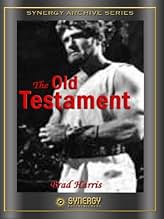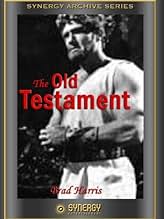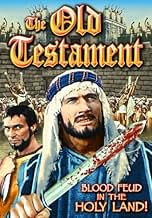Aggiungi una trama nella tua linguaThe Jews of Jerusalem are driven out by their Syrian rulers. They gather their forces, and return to drive out their oppressors.The Jews of Jerusalem are driven out by their Syrian rulers. They gather their forces, and return to drive out their oppressors.The Jews of Jerusalem are driven out by their Syrian rulers. They gather their forces, and return to drive out their oppressors.
- Regia
- Sceneggiatura
- Star
Ivano Staccioli
- Antiochus IV Epiphanes
- (as John Heston)
Franca Parisi
- Miza
- (as Margaret Taylor)
Djordje Nenadovic
- Judas
- (as George Nenadovic)
Niksa Stefanini
- a Maccabee
- (as Nicola Stefanini)
Giuseppe Mattei
- Jakar
- (as Pino Mattei)
Recensioni in evidenza
I first saw this epic on a small TV screen in B&W and it impressed me then and still does. Brad Harris is the star but plays just another one of the main characters. In 1963, you would expect him to play a Hercules type character. Brad does a great job throughout the movie. What most people don't spot is ALAN STEEL playing Jakar, a Syrian officer. He can be spotted in at least 30+ scenes and was probably in many more. Alan Steel would later go on to star a Hercules in his own series of hit movies. Most notably, the box office hit, HERCULES AGAINST THE MOONMEN in 1965. I have posted all the Alan Steel parts on Y/T. Enjoy the action.
First off let me begin by saying I really love biblical epics from the US or abroad. But "The Old Testament is a dreadful movie. The movie is not what it appears to be. This film is hardly the Old Testament (one assumes in its entirety), but just a tiny segment. I could talk about the lousy cinematography, the editing, where the shots shift from day to night as each character is speaking, or the odd strained dialog and dubbing, but why bother? I'd never heard of this stinker before, and now I know why. Although it might have some biblical significance, I would have to say avoid this one at all costs. Stick to the "Ten Commandments". Trust me.
Lousy script, lousily portrayed. Stilted dialog. Not entertaining then, painful to watch now. Certainly not historically accurate, not even of the Maccabees
3Nozz
Here's a treatment of the story of the Maccabees, which Protestants and Jews don't even consider to be part of the Old Testament. But the movie is called the Old Testament, probably for the same reason that one of the Italian actors has been dubbed John Heston and one of the actresses Susan Paget, borrowing the surnames of actors familiar from the 1956 Ten Commandments movie. Nobody seems to have thought-- nor indeed does anyone to this day, it seems-- that the Maccabees have wide commercial appeal. I don't think it's the Maccabees' story that dooms this movie, though. It's the failure to imagine that story in terms of anything but played-out stereotypes, from the supercilious villain and his fat, greedy, obsequious henchman to the Jew and pagan who (like Ben Hur and Messala) must discard their youthful friendship. Stereotyped female parts are also added to the story, out of nowhere, but the distortions don't add up to any serious misrepresentation of history. They just add up to a waste of time.
Italian Bible film with Brad Harris
This Italian-French co-production by Gianfranco Parolini, created in 1962, is called "Il vecchio Testamento", i.e. "The Old Testament" in the Italian original. And this title is appropriate, as it is about the events reported in the First and Second Books of Maccabees. The whole thing has nothing to do with Goliath. The German title was probably intended, for marketing reasons, to create a connection to all the other films with ancient muscle men that were so successful at the box office at the time. As is often the case with films of this kind, the filming took place in Yugoslavia.
About 150 B. C. In the 4th century BC, Seleucid rule (one of the Diadochian kingdoms after the death of Alexander the Great) still continues. The Syrians have occupied Jerusalem. The Hebrews defend themselves against this, especially the priest Mattathias and his defensive sons. The energetic Judas Maccabeus (very impressive: Djordje Nenadovic, who was later seen in "Unter Geiern" (1964) and in the first part of "Die Nibelungen" (1966)) particularly stands out. The resistance still fails. The Hebrews have to flee into the desert. Only Simon Maccabee (Brad Harris), the last son, will succeed in recapturing Jerusalem and the Temple. Simon was offended in his family from the start because he advocated peaceful coexistence between Hebrews and Syrians and with the beautiful Diotima (Mara Lane, the enchanting British-Austrian actress was also in Helmut Käutner's beautiful romantic film in 1957 alongside Romy Schneider and Horst Buchholz: "Monpti") also has a Syrian bride. Other actors include Franca Parisi (as Miza), Vladimir Leib (once again providing a bit of comic relief as the "funny fat guy") and Jacques Berthier (as the nasty antagonist Apollonius).
In this film, the focus is more on the story to be told. As the main actor, Brad Harris is not the focus as usual, but is just part of a relatively large ensemble. More is also required of him in terms of acting, as he also has to portray self-doubt and hurt caused by rejection by his family. In terms of content, the biblical events are greatly condensed and exaggerated, so that biblical scholars will of course not be satisfied. Nevertheless, this unusual sandal film is worth seeing because it tells an interesting story that is not very well known, but very entertaining.
Totally recommended!
This Italian-French co-production by Gianfranco Parolini, created in 1962, is called "Il vecchio Testamento", i.e. "The Old Testament" in the Italian original. And this title is appropriate, as it is about the events reported in the First and Second Books of Maccabees. The whole thing has nothing to do with Goliath. The German title was probably intended, for marketing reasons, to create a connection to all the other films with ancient muscle men that were so successful at the box office at the time. As is often the case with films of this kind, the filming took place in Yugoslavia.
About 150 B. C. In the 4th century BC, Seleucid rule (one of the Diadochian kingdoms after the death of Alexander the Great) still continues. The Syrians have occupied Jerusalem. The Hebrews defend themselves against this, especially the priest Mattathias and his defensive sons. The energetic Judas Maccabeus (very impressive: Djordje Nenadovic, who was later seen in "Unter Geiern" (1964) and in the first part of "Die Nibelungen" (1966)) particularly stands out. The resistance still fails. The Hebrews have to flee into the desert. Only Simon Maccabee (Brad Harris), the last son, will succeed in recapturing Jerusalem and the Temple. Simon was offended in his family from the start because he advocated peaceful coexistence between Hebrews and Syrians and with the beautiful Diotima (Mara Lane, the enchanting British-Austrian actress was also in Helmut Käutner's beautiful romantic film in 1957 alongside Romy Schneider and Horst Buchholz: "Monpti") also has a Syrian bride. Other actors include Franca Parisi (as Miza), Vladimir Leib (once again providing a bit of comic relief as the "funny fat guy") and Jacques Berthier (as the nasty antagonist Apollonius).
In this film, the focus is more on the story to be told. As the main actor, Brad Harris is not the focus as usual, but is just part of a relatively large ensemble. More is also required of him in terms of acting, as he also has to portray self-doubt and hurt caused by rejection by his family. In terms of content, the biblical events are greatly condensed and exaggerated, so that biblical scholars will of course not be satisfied. Nevertheless, this unusual sandal film is worth seeing because it tells an interesting story that is not very well known, but very entertaining.
Totally recommended!
I più visti
Accedi per valutare e creare un elenco di titoli salvati per ottenere consigli personalizzati
Dettagli
- Tempo di esecuzione1 ora 55 minuti
- Mix di suoni
- Proporzioni
- 2.35 : 1
Contribuisci a questa pagina
Suggerisci una modifica o aggiungi i contenuti mancanti

Divario superiore
By what name was Il vecchio testamento (1963) officially released in Canada in English?
Rispondi























